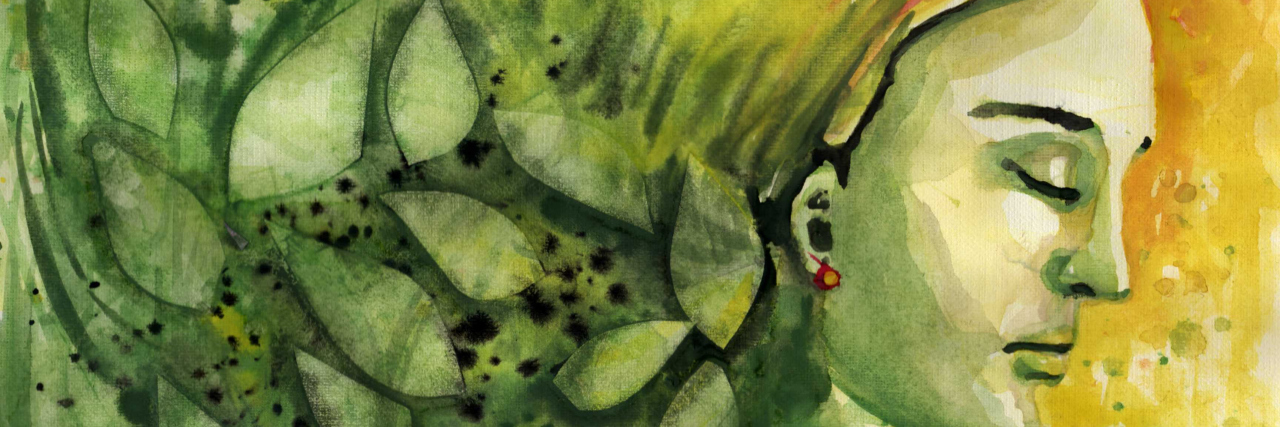When It's Hard to Find Gratitude Because of Illness, I Ask Myself This
“Life is too short. Take nothing for granted.” These are catchphrases we probably allow to roll off our tongues at one time or another. Both have so much meaning and hazard, and most likely take on a slightly different meaning for each of us.
On my Facebook support group, we have a weekly segment called “Thankful Thursday.” Members share a few things they are grateful for in their lives, or in that moment, day, or week.
It sounds easy enough, but all of our members live with debilitating chronic illness. It can be incredibly hard not to be overcome by pain and symptoms.
Nevertheless, we do all find something good in our lives to share and celebrate. It’s a lovely uplifting segment I look forward to each week.
As I was contemplating the things I was grateful for this week, I realized I was really struggling to honestly feel grateful at all.
I’m absolutely exhausted with my constant pain levels. I’m mostly housebound due to chronic illness, but still life is way too busy.
I spend a good 40 hours a week managing my online support forum. I write, network with other bloggers, spend time with my husband, do some small physical household tasks, plus look after all our administration. Overall, it’s pretty much a full-time job, while living with a debilitating, complex rare disease.
I’m incredibly grateful I can do all of the above. I’m grateful I can use my mind, as it helps distract me from my physical pain.
In that moment, as I was thinking about my exhaustion and all I was juggling, I realized there was something for which I was most grateful. It was something I never want to take for granted.
My mind, my brain, my ability to think. I am so grateful for it. More than that, I found myself saying:
“I want to use my mind while I can, I don’t want to take it for granted. I may not always have it”
Right there, right then, I felt every depth of gratefulness for being able to use my brain, not just intellectually, but in many other ways as well.
I can dream. I can remember wonderful moments in my past. I can manage my disease better by thinking through the consequences of my actions.
I can write, and I can sing. I can enjoy TV shows because my brain allows me to follow story lines.
I can have lengthy chats with my husband while relaxing together.
I can make phone calls and organize household administrative tasks.
I can read and research.
I negotiate my health care and work in partnership with my medical team.
All of this and more is because my brain is able to function.
There are many things in my life I don’t take for granted, and many that I do and shouldn’t. We all do though.
I didn’t ever really consider losing the use of my legs, but I have.
I didn’t ever really consider losing my independence, but I have.
I didn’t ever consider losing my taste and smell, but on most days I have lost both of these senses.
I didn’t think I would ever have a permanent colostomy, but I do.
Loss causes us to re-evaluate everything. That’s not a bad thing, especially if it leads us to focusing on what we still have.
My gratitude for having a functioning mind is huge. There’s an underlying reason for that.
My beautiful grandmother died from Alzheimer’s disease, and one of my aunties is currently battling this insidious condition.
Does that mean I’m likely to also have the disease later in life? Who knows. It does, however, make me so aware of the gift of a functioning mind that I never want to take it for granted.
I remember having viral pneumonia six months before I was to be married, many, many years ago. I was in hospital and my parents and fiancé had been told that my specialists were incredibly concerned, as I wasn’t responding to any treatment.
I was so focused mentally on getting well for my upcoming wedding that I didn’t for one moment consider not surviving.
What did concern me was that I couldn’t speak at all. I had never lost my voice like that before. As a singer, my main concern was would I ever be able to sing again. I was also a bank manager at the time, so talking was pretty important too.
I eventually recovered, but it took three months for my voice to return. It was a scary time and from that moment on, I have never taken my voice for granted.
If you are struggling with your chronic condition and finding it really hard to find anything to be grateful for, think about what you can still do.
What part of your body is still working?
Think about what it would be like if that part of you ceased to work.
It won’t be long before you have something very tangible to be grateful for — something you will realize you can’t ever take for granted.
Before long, you too will be gratefully taking nothing for granted.

